Game developers have got involved too, and while some of these companies clearly had honourable intentions, others seemed to view NFTs as an easy cash grab. Needless to say, that…didn’t go well.
#7 Sega
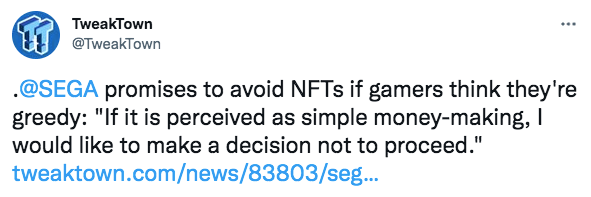
Lots of games companies have expressed interest in developing NFTs, but few seemed as committed as Sega. A recent interview with top executives floated the idea of Sega’s next big project; the mysteriously titled “SuperGame.” The concept is vague, to say the least, but it involves multiple titles using Sega’s most cutting edge technologies. It would also incorporate NFTs, and what looks like a Sega NFT logo has surfaced. The company branded NFTs as the future of gaming and seemed bent upon utilising them. That was before a massive fan backlash that gave them a change of heart. Sega subsequently back-peddled and blamed its fanbase for thinking that NFTs are a “simple money-making scheme.”
#6 S.T.A.L.K.E.R. 2: Heart of Chernobyl
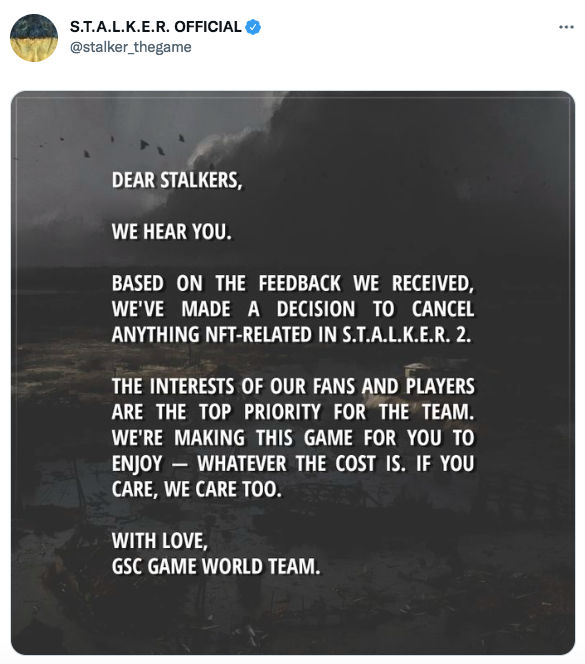
The S.T.A.L.K.E.R series is a popular survival horror game on Windows and Xbox. It utilises the powerful Unreal Engine and is set to be one of the biggest releases of 2022. Developers GSC Game World announced a raft of NFT functionality including the chance to become a “meta human.” Players would have bid for an NFT at auction with the winner being scanned into the game as an NPC. A huge and vocal backlash followed on social media. At first, GSC tried to explain the decision (raising several valid points about smaller developers needing to raise cash to create) and asked fans to understand, even if they didn’t agree. The fans did neither. The tweet was quickly deleted and replaced with one announcing that NFTs would not be included in the game. Quite the turnaround, and one that only took 24 hours.
#5 Troy Baker
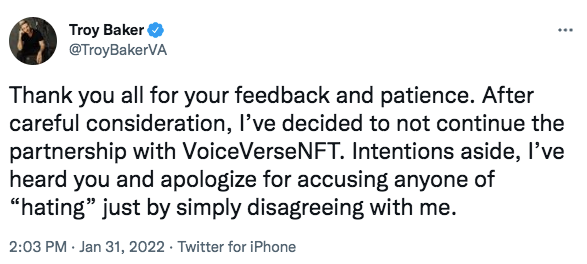
Although he isn’t a developer, Troy Baker is a big deal. He’s the voice behind many of gaming’s most iconic characters including Joel from the Last of Us, Pagin Min from Far Cry and Sam Drake from Uncharted. He even holds the record for the most acting nominations at the BAFTA Games Awards. He was also very close to being the voice behind a series of so called “voice NFTs” created by Voiceverse. The company generates AI voiceovers and Baker would have been its biggest signing by far. He announced the partnership on Twitter and was immediately subjected to a barrage of criticism. Some raised the spectre of NFT’s environmental impact, others suggested that he would struggle to work again in the future. Some even claimed that Voiceverse as a concept was harmful because it could replace actors. Baker initially defended himself, branding critics haters, before climbing down, apologising and terminating his involvement with the project. It looks as though he might have had a lucky escape because Voiceverse subsequently admitted to using voices from a different AI service without permission.
#4 Behaviour Interactive
Behaviour Interactive is the developer behind Dead by Daylight, a wildly popular online multiplayer survival horror game. Survivors battle a killer trying to impale them on hooks and sacrifice them to a higher power named The Entity. The developer collaborated with Boss Protocol to release 10,000 Pinhead NFTs. Confusion quickly took hold as it was initially presumed that the NFTs would give players exclusive in-game content, which Behaviour Interactive denied. Reaction to the news was overwhelmingly negative and one Twitter user even demanded a refund on the latest DLC because they didn’t know it would be used to fund NFTs. In response, Behaviour Interactive issued the following confusing apology:
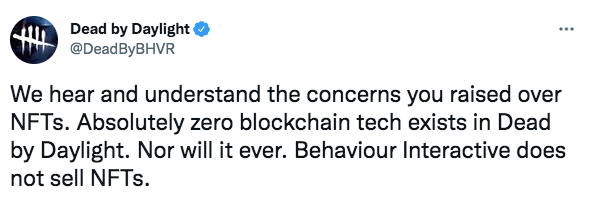
As one user pointed out, it wasn’t about Behaviour Interactive selling NFTs itself, but rather them partnering up with another company to monetise character models. The result is a befuddling mess with many people left wondering who’s making the NFTs, how they actually benefit owners and whether the whole thing is a scam.
#3 F1 Delta Time

Note the floor price - https://opensea.io/collection/f1-delta-time
It’s difficult to overstate how important F1 Delta Time was to NFT gaming. Launched way back in 2019 it was one of the first fully licensed NFT games and one of the first full stop - this was long before the big NFT boom of 2020. Players collected cars, drivers and components. Unfortunately, the value of the NFTs was tied up with their official F1 licensing. When the game lost that licence in March 2021 it announced that it was shutting down, rendering players’ NFTs…well…basically worthless. The developers have since offered to compensate collectors in a variety of ways, including tokens for other on-chain motorsports games. Still, it’s an ignominious end for an officially licensed game and one that should have achieved so much more.
#2 Team 17’s Metaworms
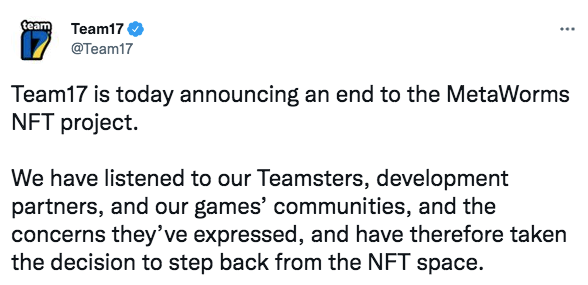
Team 17 might not be the household name that it once was, but for gamers of a certain age, the company is legendary. It developed the iconic Worms series, one of the defining titles of the early console era. Metaworms was supposed to be a generative project based on Worms artwork. Perhaps anticipating a backlash, Team 17 announced that it wouldn’t be energy intensive and that donations would be made to sustainability projects, but this wasn’t enough to stop a barrage of criticism. Some of this even came from other developers who announced that they wouldn’t work with Team 17 again if they proceeded down this route. As the team endured abuse across multiple networks, there was also speculation that Team 17 employees hadn’t been notified of - and weren’t on board with - the NFT plan. In total, the Metaworms projected managed to survive a day before being axed.
#1 Ubisoft
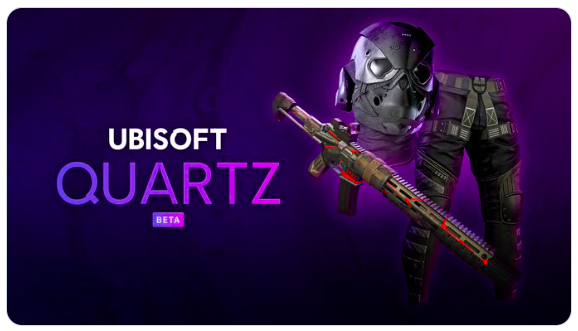
By any barometer, Ubisoft’s attempted implementation of NFTs was an unmitigated disaster. Ubisoft Digits (and the accompanying Quartz platform) was supposed to be the company’s grand entrance into the NFT world. Released alongside Tom Clancy’s Ghost Recon, the NFTs allowed players to purchase items like new weapons, skins and helmets. These could be freely traded across all AAA games (with Ubisoft taking a cut of course). Digits was greeted with a tsunami of negativity. The YouTube announcement alone garnered 31,000 dislikes before being removed and the backlash across Twitter was just as severe. Even Ubisoft’s own staff complained. Sales were equally terrible, with only 15 sold by the end of the first month. Ubisoft has long been one of the biggest offenders when it comes to microtransactions and has a reputation for squeezing gamers for as many dollars as it can. According to them the NFTs flopped because gamers didn’t understand them, though.
Read more:
Top 9 Celeb NFT Fails
NFTs as DLC


